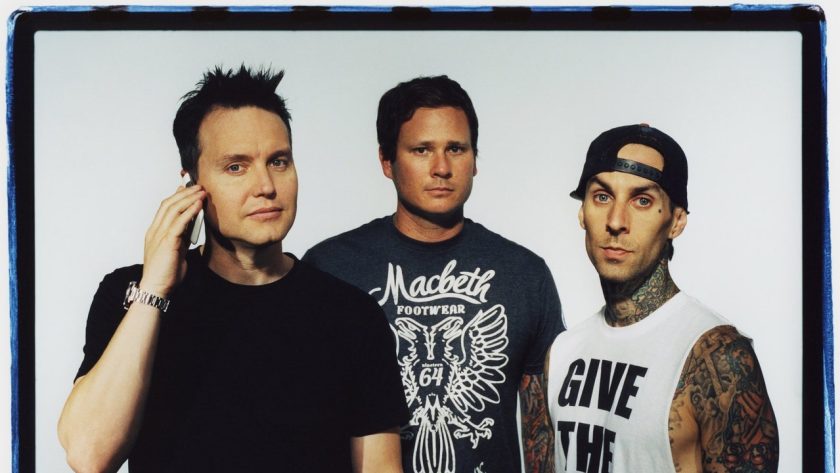Midway through the trailer for Blink-182’s comeback LP One More Time…, which lands this Friday, interviewer Zane Lowe turns to Travis Barker and earnestly exclaims, “You produced the shit out of this album.”
Based on the handful of tracks the band have previewed thus far, that certainly seems true: Barker, the virtuosic Blink drummer who’s spent the last few years producing Blink-aping pop-punk-lite records for the likes of Machine Gun Kelly and Avril Lavigne, has finally gotten the chance to apply his blockbuster formula to the genuine article. He supercharged the One More Time… sessions by recruiting a cabal of hitmaking songwriters like Aldae, who co-wrote a sizable swath of the last Justin Bieber album, and OneRepublic frontman Ryan Tedder, whose own band’s target audience is whoever picks the music for Jeep commercials. The results sound, to paraphrase Lowe, like they’ve been produced to shit—the songs are glossy, efficient, and largely anodyne.
That feels par for the course with the entirety of this latest Blink reunion, prompted by founding guitarist-turned-UFO truther Tom Delonge’s return to the fold late last year after jumping ship (for the second time) in 2015. The band’s surprise Coachella performances and subsequent gargantuan world tour have all felt raucous and celebratory, but also a tad perfunctory, their first true foray into the congenial-legacy-act zone. And while it’s hard to begrudge Blink-182 a harmonious, drama-free third act—lord knows they’ve been through enough, what with bassist Mark Hoppus overcoming stage 4 lymphoma, Barker’s harrowing 2008 plane crash, and Delonge’s well-documented struggles with painkiller addiction—there is at least an argument to be made that the band’s musical output is best when its members are a little bit more at odds with one another creatively.
For proof, look no further than the very last project Blink dropped before Delonge’s most recent departure: 2012’s Dogs Eating Dogs, a five-song EP that easily ranks as the most overlooked and underrated entry in the band’s discography. It arrived at an oddly precarious moment for the otherwise globe-conquering, genre-defining outfit. A year prior, Neighborhoods—the band’s first album following their initial 2005 breakup—flopped commercially, causing them to split from their longtime label Interscope. The problem with Neighborhoods, Barker argued at the time, was a literal lack of togetherness; Delonge had recorded his parts in San Diego, Hoppus and Barker did theirs in LA, and the trio traded the tracks back and forth over email until they were complete. “There’s some songs on (Neighborhoods) that I love, but for the most part it was disconnected,” Barker told Rolling Stone in 2012. “When we’re not in the studio together, you don’t have the opportunity to gel off each other.”
Unsigned and uncertain of the future, the trio piled into a studio together for a few days in November 2012 and tried to reconnect as a band. The years they’d spent apart in the late aughts had deepened and exaggerated each of their individual personas almost to the point of caricature. Delonge had spent that era power-stancing in front of strobe lights with Angels & Airwaves, his U2-meets-Coheed and Cambria stadium rock ensemble, and was more full of jangly knockoff Edge riffs and galaxy-brain lyrics than ever before. Hoppus, ever the amiable, straight-ahead pop-punk lifer, had cranked out more Blink-esque radio rock with Barker in their follow-up project +44 and hosted a short-lived talk show on Fuse. And Barker, a genuine savant behind the skins, had begun his run as the go-to session drummer for any artist in need of a little extra attitude, hopping on remixes with everyone from Rihanna to Soulja Boy. The magic in many of the best Blink songs—like, say, “Feeling This” or “Stay Together for the Kids”—is in hearing those three opposing forces come together and barely avoid blowing apart at the seams. (Comedian Whitmer Thomas has a great bit about this dynamic.) They pulled that trick off only occasionally on Neighborhoods, but it’s the defining quality on every track of Dogs Eating Dogs.
“When I Was Young,” the EP’s opener, locks down Delonge’s existential headiness with a punchy, hard-hitting, Hoppus-assisted chorus. The title track flips that script entirely, livening up Hoppus’s breakneck verses with the occasional anthemic Delonge wail. Barker’s proclivity for whirring synths and booming fills comes through loud and clear on the proggy “Disaster,” while “Boxing Day” makes good on Hoppus’s one-time ambition to make +44 a sort of pop-punk Postal Service. By the time Yelawolf shows up for an unfortunate guest spot on the Delonge-led closer “Pretty Little Girl,” you’re almost willing to forgive it as an off-kilter nod to Barker’s hip-hop side hustles. The songs are all about the same stuff Blink has been singing about since their potty-mouthed primordial days on Kung Fu Records—falling for girls, breaking up with girls, getting back together with girls—but they’re shaggier, messier, more experimental and complicated. Dogs Eating Dogs painted an exhilarating new way forward for Blink—and then the band fell apart a couple years later and it never fully came to fruition.
There’s still hope yet for One More Time…—“More Than You Know” has that jagged, biting energy in spades—but most of the songs released so far have had their rough edges sanded down too smooth, and feel more aimed at back-to-basics nostalgia than hard-earned progress. Maybe once the euphoria of this juggernaut reunion rollout has quieted a little, Blink-182 will get back to the task of figuring out who they want to be next. For now, though, we have Dogs Eating Dogs as a tantalizing taste of what might still be to come.



